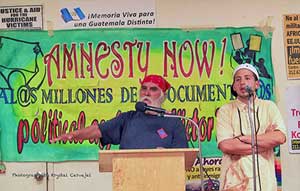Victor Toro continues struggle for political asylum
By
Dee Knight
New York
Published May 19, 2011 10:04 PM
|
Victor Toro, left, at International Action Center
meeting, May 11.
Photo: Krystal Carvajal
|
Exiled Chilean revolutionary Victor Toro and his attorney, Carlos Moreno, spoke
at the International Action Center here May 11, explaining the U.S. Immigration
Court’s rejection of Toro’s application for political asylum. The
occasion was the release of the complete transcript of Toro’s Immigration
Court hearings, which began in January 2008 and continued intermittently until
December 2010. The complete transcript will be available soon for download from
www.May1.info.
“I have won cases with one-third of the evidence introduced in this
case,” declared Moreno. “Asylum is about persecution because of
political belief. In this case they’re repeating the persecution
again.” Moreno said he will soon appeal the case to the next judicial
level and take it to the highest court necessary to win.
Toro “deserves to stay here. They owe him asylum because the United
States invested more than $7 million to overthrow the Popular Unity government
of Chile,” Moreno said. “He’s here because of what the U.S.
administration did. This debt is not symbolic. They’re responsible for
his being here.” Moreno added that the Senate Select Committee to Study
Governmental Operations with Respect to Intelligence Activities, chaired by
Idaho Sen. Frank Church, documented these claims in 1975 and 1976.
Following the CIA-engineered murder of President Salvador Allende, a socialist,
and the overthrow of his Popular Unity government on Sept. 11, 1973, Toro was
arrested and tortured by the U.S.-backed military dictatorship of Gen. Augusto
Pinochet. He was among thousands of Chileans, including hundreds of members of
the Revolutionary Left Movement (MIR), who received such treatment.
The Immigration Court transcript includes testimony that Toro and his spouse,
Nieves Ayress, were tortured extensively while in prison for three years, from
1974 to 1977. In late 1977, Toro was expelled and forced into exile, living
first in Sweden and then Cuba until 1983, then in Mexico until late 1984, when
he entered the United States by crossing into El Paso, Texas.
Appeals & campaigns planned
Both Moreno and Toro expressed confidence that he would ultimately win his bid
for asylum through legal appeals and massive political campaigns. Moreno
observed that the government based its rejection on unproven charges that Toro
was and remains a “terrorist.”
Meanwhile, a known terrorist against Cuba, Luis Posada Carriles, was recently
released from deportation proceedings, despite the fact that the U.S. Justice
Department had urged the court to keep him in jail because he was “an
admitted mastermind of terrorist plots and attacks.” (New York Times,
April 11)
Moreno said Toro’s legal appeals must be combined with massive public
pressure on both President Barack Obama and Attorney General Eric Holder. Toro
remarked, “Obama could stop my deportation — and all of them
— with a stroke of a pen. If he signed a decree to kill Osama bin Laden,
he could decree that families be reunited.” Toro added, “I
don’t believe even one ‘terrorist’ has crossed the
U.S.-Mexican border. The real terrorists have come with the aid of politicians
and the CIA.”
Responding to Obama’s May 10 speech in El Paso calling for immigration
reform, Toro commented, “Obama says we need to push for immigration
reform, but ‘this can’t be done without the Republicans.’
He’s saying the Democrats can’t do anything without the Republicans
— because they aren’t real democrats.
“We need to create a huge popular movement against the
Republicans,” Toro continued. “But our struggle is against the
whole system. We have to push for a popular movement of millions against
capitalist exploitation and imperialist oppression. We’ve been betting on
the popular struggle here — all the struggles we’ve waged for
political asylum and the May 1 movements.”
“We can say OK to reform, but without deportations and raids,”
declared Toro. “We have to unite forces. The only way to win either in
the courts or in Congress is if the people move and unite.”
Toro noted, “Obama recognizes 11 million undocumented immigrants in the
U.S. now. That subtracts the more than 1 million deported during his
administration, but is less than James Petras’ estimate of 20
million.”
Every year, over the past five years, according to Amnesty International,
nearly half a million people have crossed the Mexican border to the United
States without papers. “It can’t be otherwise, with the Mexican
crisis. No one can stop people seeking something to eat, for survival,”
Toro said. “Our people know NAFTA [the North American Free Trade
Agreement] means only hunger and unemployment for them.”
Concluding his remarks, Victor Toro thanked a long list of supporters and
expressed solidarity with the Indigenous Mapuche fighters now conducting a
25-day hunger strike against Chile’s anti-terrorist law, which is aimed
at Indigenous people. He also expressed solidarity with people everywhere
fighting against imperialism. “Don’t worry about my personal
fate,” he said. “The struggle has been launched, it can’t be
stopped, and that’s the important thing.”
Articles copyright 1995-2012 Workers World.
Verbatim copying and distribution of this entire article is permitted in any medium without royalty provided this notice is preserved.
Workers World, 55 W. 17 St., NY, NY 10011
Email:
[email protected]
Subscribe
[email protected]
Support independent news
DONATE


